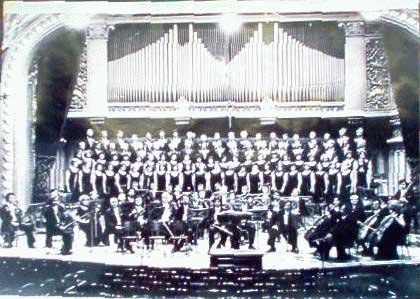
|
|
History
|
|
The miracle of existing, the divine grace, or the gift made of beauty creates the destiny of a land or of a town, conferring to it attributes of permanence. Lugoj has always rimed with music and its inhabitants found in the art of the coral singing some potentialities that were first cultivated as an expression of strong feeling of identity and of pathetic affirmation of their national consciousness and then as an achievement of some native qualities passed from one generation to another and becoming in this a real tradition. |
| It has been working here since 1810 (even 1808 maybe) a choir of the Orthodox Church, a choir which extended its activity in the sphere of the laic music and became an official institution under the name of „Reuniunea de Cântari si Muzica” („The Romanian Society of Songs and Music”). In 1889 a high personality of the Romanian musical life, Ion Vidu, became the leader of the society, this meant making known the choir of Lugoj all over the country. In the Banat district this choir has been known under the name of „Ion Vidu Choir”. This choir was a real „pilot institution” for the choral movement of this part of the country. |
| The joy of singing became a spiritual binder and of all the choirs of the town the one conducted by Ion Vidu, well known pedagogue and composer, author of several choir songs, was a very particular one. Ion Vidu’s successors such as Filaret Barbu and Dimitrie Stan continued his works enlarging its repertory maintining its artistic quality and its national prestige. |
| The “Ion Vidu” choir has an ascending route, it exists under the aegis of the House of Culture and it is sponsored by the Municipality of Lugoj. In 1968 the conductor’s baton is taken by a very gifted musician, Remus Taşcău, a musician who although he was young he could impose a new esthetic program and could fulfill it in almost 35 years in front of the choir. Educated in the Music school of Cluj where he had great teachers such as Dorin Pop, Tudor Jarda or Dan Voiculescu, the young conductor modified his view and his capacity to modelate the ensemble, his authority being a result of the combination of a large artistic horizon with an ever vivid sensitiveness and an inner talent for such a task that asks rigor temerity and a power of suggestion and a high level of interpretation and above all a great force of the artistic vocation. |

|
| Over four centuries of choral music can be found in the “Ion Vidu” choir repertory from Palestrina and Monteverdi to Poulenc and Milhaud and also the works belonging to the baroque, classicism or romanticism or some works of some famous Romanian composers, from Sabin Drăgoi, Marţian Negrea and Paul Constantinescu (Prize of the Composers’ Union for interpreting Mioriţa), Sigismund Toduţă, Tudor Jarda, Alexandru Paşcanu or Adrian Pop. |
| For the destiny and the critical perception of the undoubted performances of the group its contributions to performing some famous opuses beginning with: Orpheus and Euridice by Gluck and Acis and Galatea by Haendel to Beethoven’s 9-th Symphony and Phantasy for Piano, Choir and Orchestra and Verdi’s Requiem. All these were performed with famous conductors such as: Mihai Brediceanu, Nicolae Boboc, Remus Georgescu, Peter Oschanitzky, the first symphonic orchestra of the country, the Philarmonic “George Enescu” from Bucharest and that of Timisoara, together with great opera singers: Sanda Ilca-Şandru, Martha Kessler, Edith Simon, Corina Circa, Pompei Hărăşteanu, Ionel Voineag and many others. The concerts of an artistic quality offsetted the fact that it wasn’t a professional choir but a very ambitious one. Speaking about the choir’s activity under the cupola of the Romanian Athenaeum, the musicologist George Firca said that “Under Remus Taşcău’s baton the “Ion Vidu” Choir became the “equal” of the Philarmonic of Budcharest”.
|
|




 Romana
Romana
